University Case Study: Analysis of Ethical Issues at Westpac Bank
VerifiedAdded on 2022/08/21
|13
|2854
|14
Case Study
AI Summary
This case study examines the ethical issues faced by Westpac Bank, focusing on incidents of money laundering and child exploitation, which led to significant reputational damage and legal repercussions. The analysis delves into the ethical dilemmas presented, exploring the application of ethical theories such as utilitarianism and virtue ethics to understand the bank's actions and failures. The study highlights leadership shortcomings, particularly the CEO's role and the lack of effective communication and transparency within the organization. Recommendations are made to improve corporate governance, leadership practices, and adherence to ethical standards, including forming a board with diverse skills, promoting transparency, and fostering ethical leadership. The study emphasizes the importance of ethical behavior for the long-term sustainability and success of financial institutions, providing insights into how Westpac could have better managed the crises and maintained stakeholder trust. The conclusion underscores the importance of ethical considerations in the face of economic challenges and the need for proactive measures to prevent future ethical breaches.
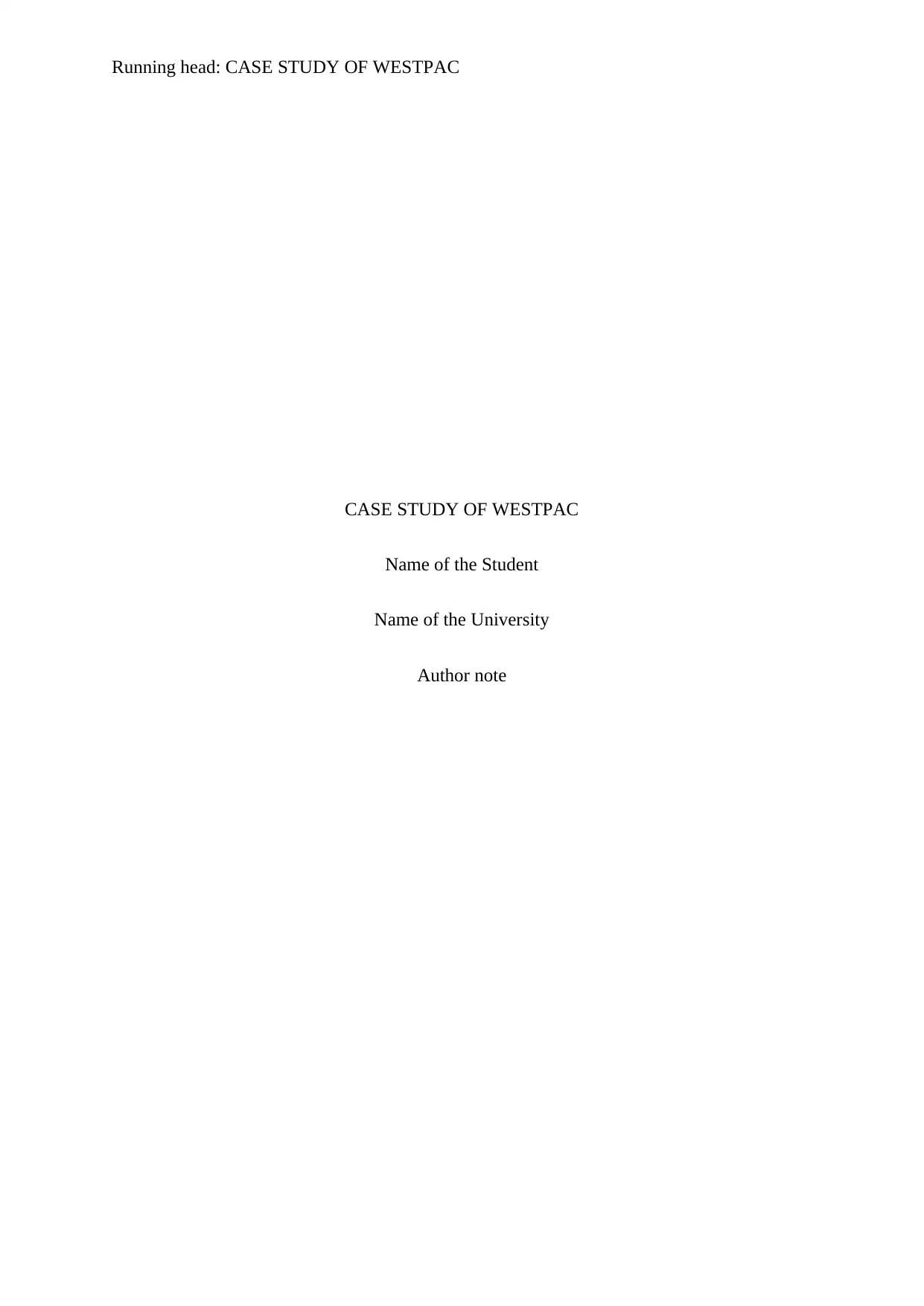
Running head: CASE STUDY OF WESTPAC
CASE STUDY OF WESTPAC
Name of the Student
Name of the University
Author note
CASE STUDY OF WESTPAC
Name of the Student
Name of the University
Author note
Paraphrase This Document
Need a fresh take? Get an instant paraphrase of this document with our AI Paraphraser
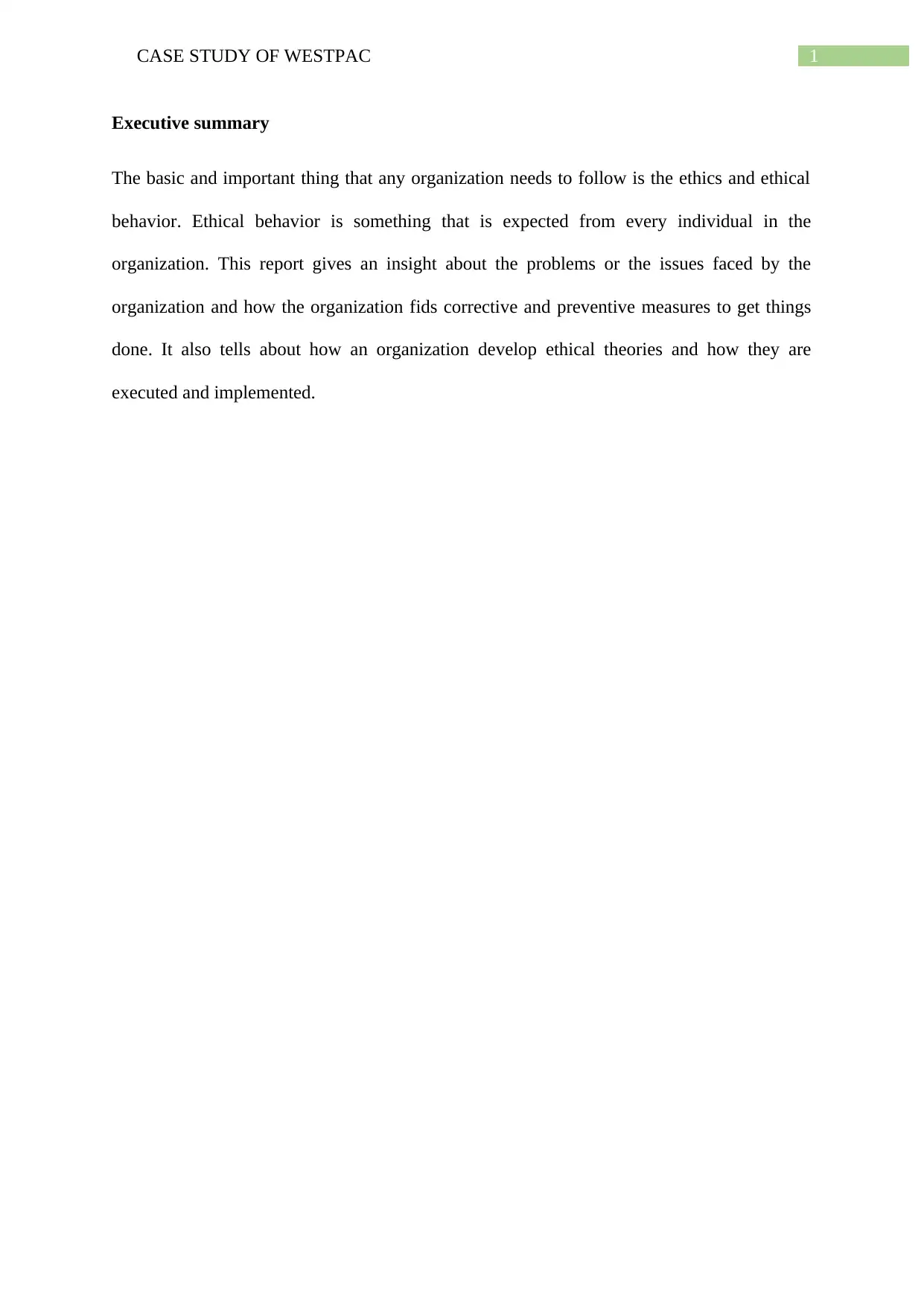
1CASE STUDY OF WESTPAC
Executive summary
The basic and important thing that any organization needs to follow is the ethics and ethical
behavior. Ethical behavior is something that is expected from every individual in the
organization. This report gives an insight about the problems or the issues faced by the
organization and how the organization fids corrective and preventive measures to get things
done. It also tells about how an organization develop ethical theories and how they are
executed and implemented.
Executive summary
The basic and important thing that any organization needs to follow is the ethics and ethical
behavior. Ethical behavior is something that is expected from every individual in the
organization. This report gives an insight about the problems or the issues faced by the
organization and how the organization fids corrective and preventive measures to get things
done. It also tells about how an organization develop ethical theories and how they are
executed and implemented.
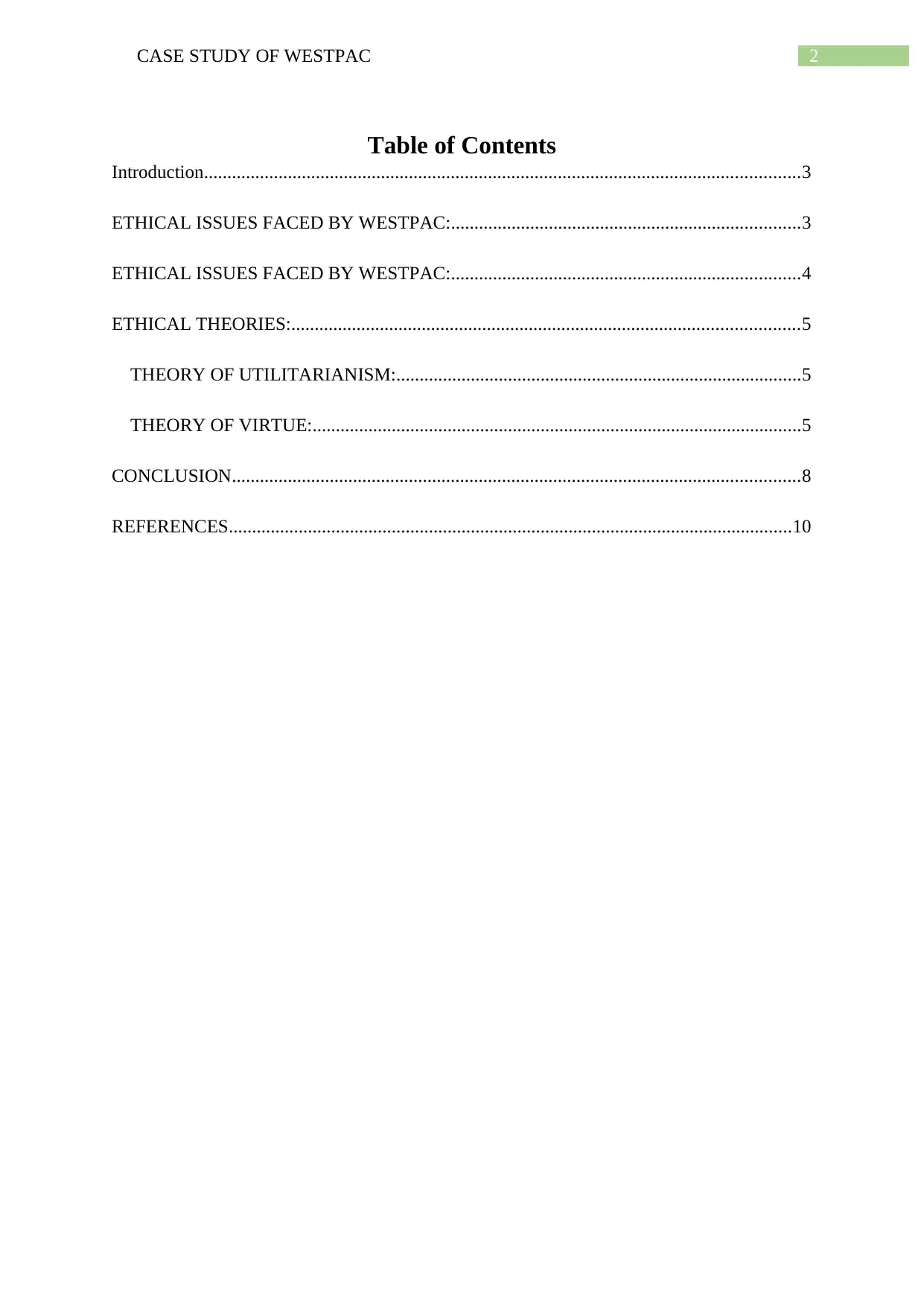
2CASE STUDY OF WESTPAC
Table of Contents
Introduction................................................................................................................................3
ETHICAL ISSUES FACED BY WESTPAC:...........................................................................3
ETHICAL ISSUES FACED BY WESTPAC:...........................................................................4
ETHICAL THEORIES:.............................................................................................................5
THEORY OF UTILITARIANISM:.......................................................................................5
THEORY OF VIRTUE:.........................................................................................................5
CONCLUSION..........................................................................................................................8
REFERENCES.........................................................................................................................10
Table of Contents
Introduction................................................................................................................................3
ETHICAL ISSUES FACED BY WESTPAC:...........................................................................3
ETHICAL ISSUES FACED BY WESTPAC:...........................................................................4
ETHICAL THEORIES:.............................................................................................................5
THEORY OF UTILITARIANISM:.......................................................................................5
THEORY OF VIRTUE:.........................................................................................................5
CONCLUSION..........................................................................................................................8
REFERENCES.........................................................................................................................10
⊘ This is a preview!⊘
Do you want full access?
Subscribe today to unlock all pages.

Trusted by 1+ million students worldwide
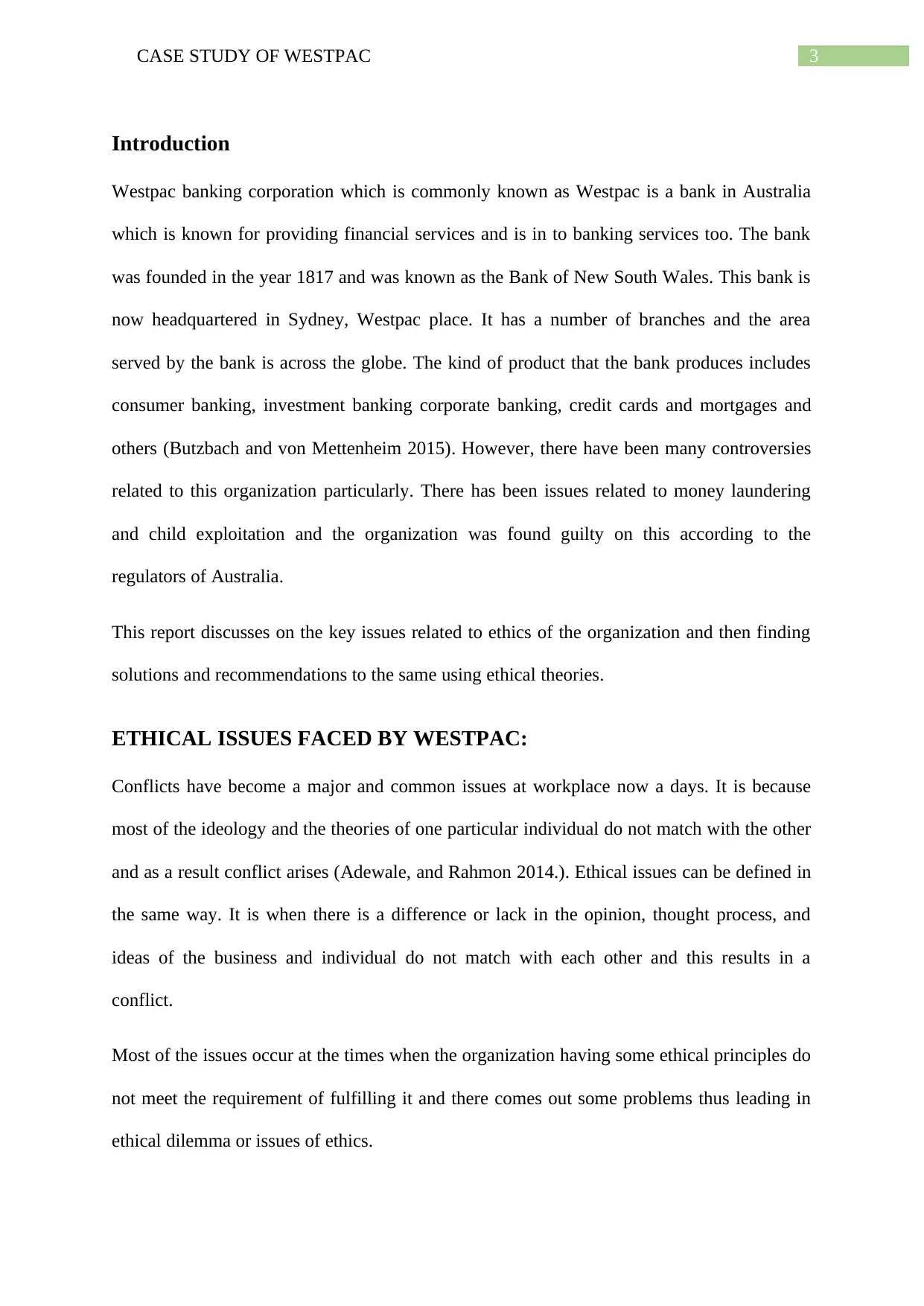
3CASE STUDY OF WESTPAC
Introduction
Westpac banking corporation which is commonly known as Westpac is a bank in Australia
which is known for providing financial services and is in to banking services too. The bank
was founded in the year 1817 and was known as the Bank of New South Wales. This bank is
now headquartered in Sydney, Westpac place. It has a number of branches and the area
served by the bank is across the globe. The kind of product that the bank produces includes
consumer banking, investment banking corporate banking, credit cards and mortgages and
others (Butzbach and von Mettenheim 2015). However, there have been many controversies
related to this organization particularly. There has been issues related to money laundering
and child exploitation and the organization was found guilty on this according to the
regulators of Australia.
This report discusses on the key issues related to ethics of the organization and then finding
solutions and recommendations to the same using ethical theories.
ETHICAL ISSUES FACED BY WESTPAC:
Conflicts have become a major and common issues at workplace now a days. It is because
most of the ideology and the theories of one particular individual do not match with the other
and as a result conflict arises (Adewale, and Rahmon 2014.). Ethical issues can be defined in
the same way. It is when there is a difference or lack in the opinion, thought process, and
ideas of the business and individual do not match with each other and this results in a
conflict.
Most of the issues occur at the times when the organization having some ethical principles do
not meet the requirement of fulfilling it and there comes out some problems thus leading in
ethical dilemma or issues of ethics.
Introduction
Westpac banking corporation which is commonly known as Westpac is a bank in Australia
which is known for providing financial services and is in to banking services too. The bank
was founded in the year 1817 and was known as the Bank of New South Wales. This bank is
now headquartered in Sydney, Westpac place. It has a number of branches and the area
served by the bank is across the globe. The kind of product that the bank produces includes
consumer banking, investment banking corporate banking, credit cards and mortgages and
others (Butzbach and von Mettenheim 2015). However, there have been many controversies
related to this organization particularly. There has been issues related to money laundering
and child exploitation and the organization was found guilty on this according to the
regulators of Australia.
This report discusses on the key issues related to ethics of the organization and then finding
solutions and recommendations to the same using ethical theories.
ETHICAL ISSUES FACED BY WESTPAC:
Conflicts have become a major and common issues at workplace now a days. It is because
most of the ideology and the theories of one particular individual do not match with the other
and as a result conflict arises (Adewale, and Rahmon 2014.). Ethical issues can be defined in
the same way. It is when there is a difference or lack in the opinion, thought process, and
ideas of the business and individual do not match with each other and this results in a
conflict.
Most of the issues occur at the times when the organization having some ethical principles do
not meet the requirement of fulfilling it and there comes out some problems thus leading in
ethical dilemma or issues of ethics.
Paraphrase This Document
Need a fresh take? Get an instant paraphrase of this document with our AI Paraphraser
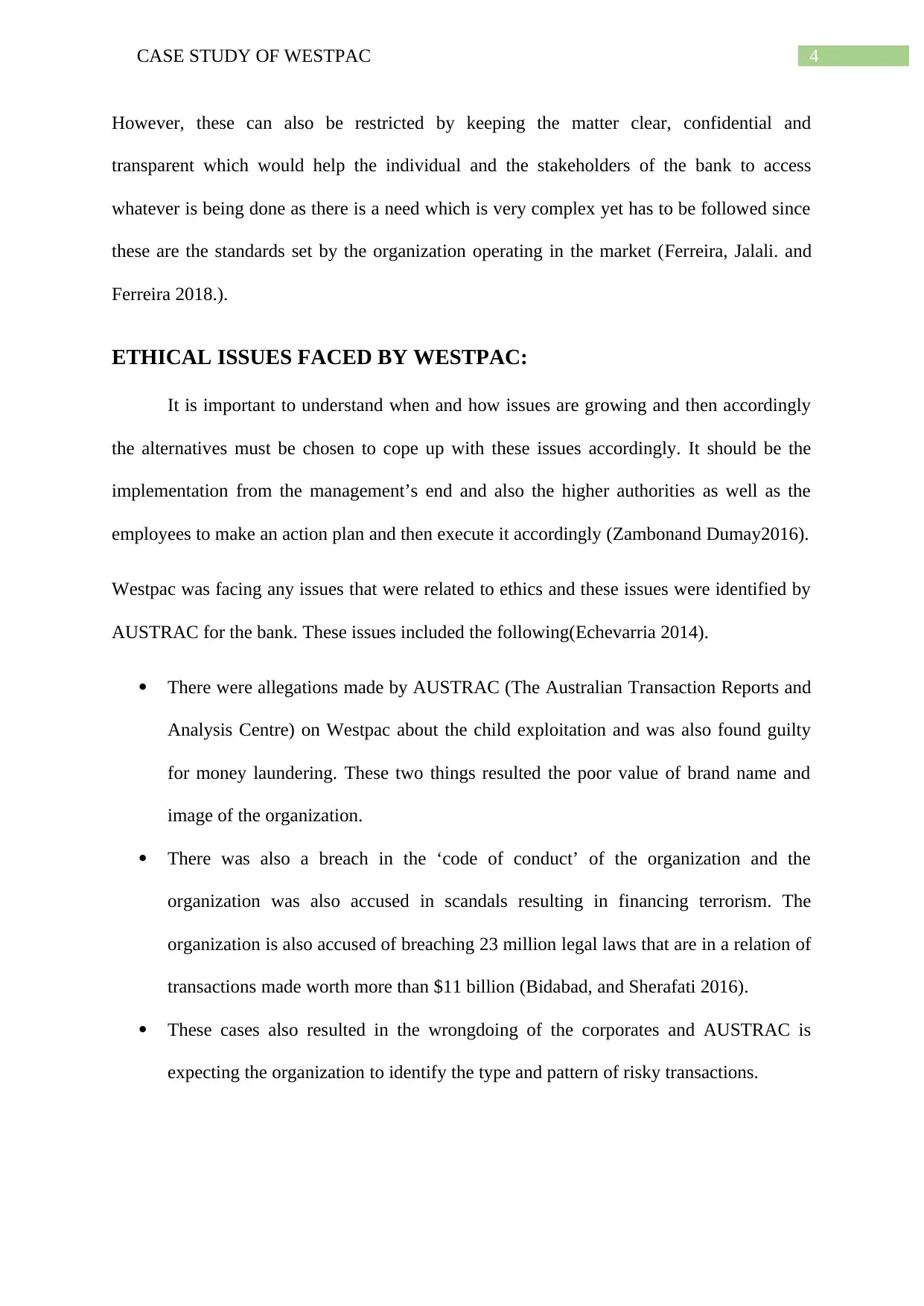
4CASE STUDY OF WESTPAC
However, these can also be restricted by keeping the matter clear, confidential and
transparent which would help the individual and the stakeholders of the bank to access
whatever is being done as there is a need which is very complex yet has to be followed since
these are the standards set by the organization operating in the market (Ferreira, Jalali. and
Ferreira 2018.).
ETHICAL ISSUES FACED BY WESTPAC:
It is important to understand when and how issues are growing and then accordingly
the alternatives must be chosen to cope up with these issues accordingly. It should be the
implementation from the management’s end and also the higher authorities as well as the
employees to make an action plan and then execute it accordingly (Zambonand Dumay2016).
Westpac was facing any issues that were related to ethics and these issues were identified by
AUSTRAC for the bank. These issues included the following(Echevarria 2014).
There were allegations made by AUSTRAC (The Australian Transaction Reports and
Analysis Centre) on Westpac about the child exploitation and was also found guilty
for money laundering. These two things resulted the poor value of brand name and
image of the organization.
There was also a breach in the ‘code of conduct’ of the organization and the
organization was also accused in scandals resulting in financing terrorism. The
organization is also accused of breaching 23 million legal laws that are in a relation of
transactions made worth more than $11 billion (Bidabad, and Sherafati 2016).
These cases also resulted in the wrongdoing of the corporates and AUSTRAC is
expecting the organization to identify the type and pattern of risky transactions.
However, these can also be restricted by keeping the matter clear, confidential and
transparent which would help the individual and the stakeholders of the bank to access
whatever is being done as there is a need which is very complex yet has to be followed since
these are the standards set by the organization operating in the market (Ferreira, Jalali. and
Ferreira 2018.).
ETHICAL ISSUES FACED BY WESTPAC:
It is important to understand when and how issues are growing and then accordingly
the alternatives must be chosen to cope up with these issues accordingly. It should be the
implementation from the management’s end and also the higher authorities as well as the
employees to make an action plan and then execute it accordingly (Zambonand Dumay2016).
Westpac was facing any issues that were related to ethics and these issues were identified by
AUSTRAC for the bank. These issues included the following(Echevarria 2014).
There were allegations made by AUSTRAC (The Australian Transaction Reports and
Analysis Centre) on Westpac about the child exploitation and was also found guilty
for money laundering. These two things resulted the poor value of brand name and
image of the organization.
There was also a breach in the ‘code of conduct’ of the organization and the
organization was also accused in scandals resulting in financing terrorism. The
organization is also accused of breaching 23 million legal laws that are in a relation of
transactions made worth more than $11 billion (Bidabad, and Sherafati 2016).
These cases also resulted in the wrongdoing of the corporates and AUSTRAC is
expecting the organization to identify the type and pattern of risky transactions.
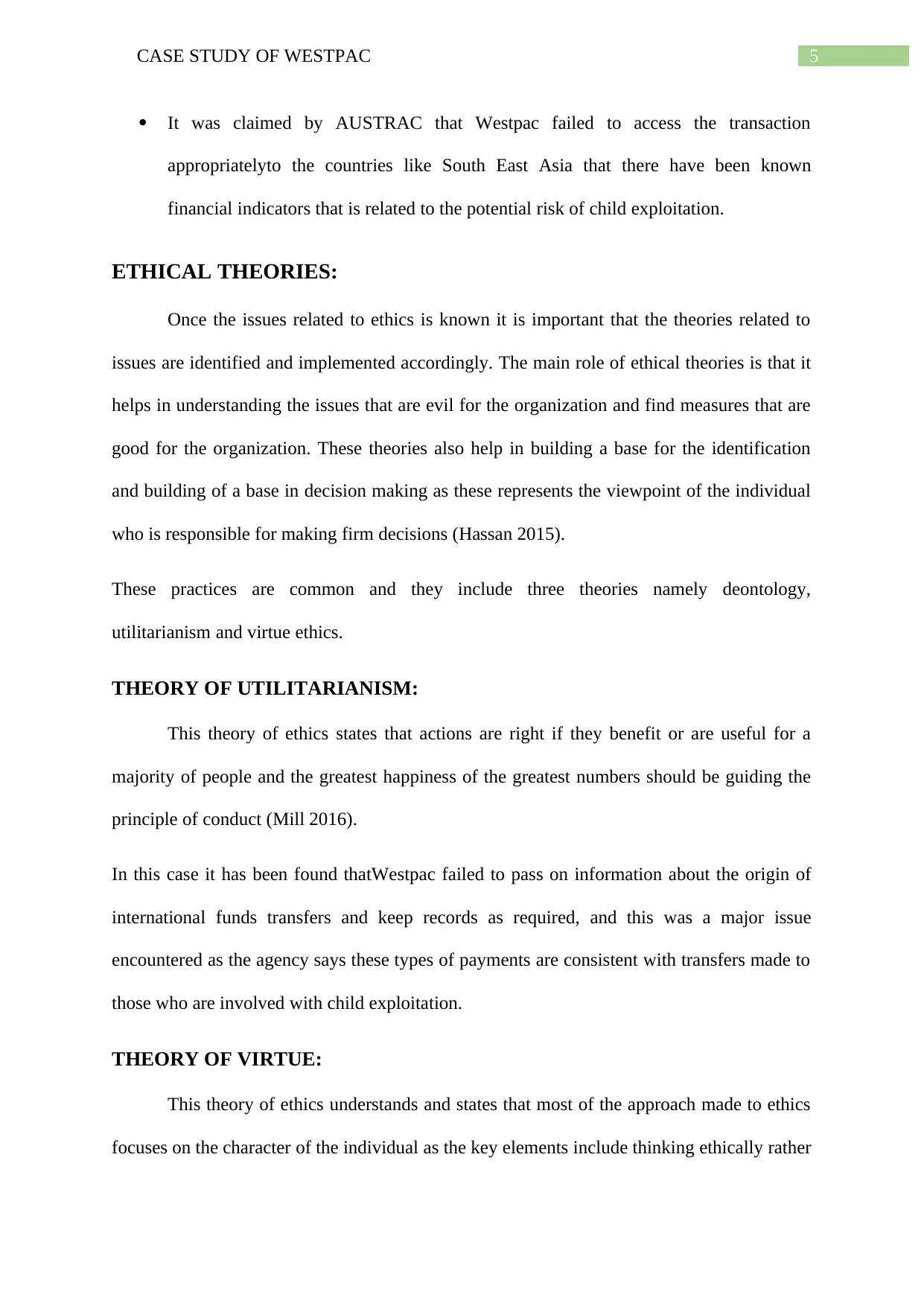
5CASE STUDY OF WESTPAC
It was claimed by AUSTRAC that Westpac failed to access the transaction
appropriatelyto the countries like South East Asia that there have been known
financial indicators that is related to the potential risk of child exploitation.
ETHICAL THEORIES:
Once the issues related to ethics is known it is important that the theories related to
issues are identified and implemented accordingly. The main role of ethical theories is that it
helps in understanding the issues that are evil for the organization and find measures that are
good for the organization. These theories also help in building a base for the identification
and building of a base in decision making as these represents the viewpoint of the individual
who is responsible for making firm decisions (Hassan 2015).
These practices are common and they include three theories namely deontology,
utilitarianism and virtue ethics.
THEORY OF UTILITARIANISM:
This theory of ethics states that actions are right if they benefit or are useful for a
majority of people and the greatest happiness of the greatest numbers should be guiding the
principle of conduct (Mill 2016).
In this case it has been found thatWestpac failed to pass on information about the origin of
international funds transfers and keep records as required, and this was a major issue
encountered as the agency says these types of payments are consistent with transfers made to
those who are involved with child exploitation.
THEORY OF VIRTUE:
This theory of ethics understands and states that most of the approach made to ethics
focuses on the character of the individual as the key elements include thinking ethically rather
It was claimed by AUSTRAC that Westpac failed to access the transaction
appropriatelyto the countries like South East Asia that there have been known
financial indicators that is related to the potential risk of child exploitation.
ETHICAL THEORIES:
Once the issues related to ethics is known it is important that the theories related to
issues are identified and implemented accordingly. The main role of ethical theories is that it
helps in understanding the issues that are evil for the organization and find measures that are
good for the organization. These theories also help in building a base for the identification
and building of a base in decision making as these represents the viewpoint of the individual
who is responsible for making firm decisions (Hassan 2015).
These practices are common and they include three theories namely deontology,
utilitarianism and virtue ethics.
THEORY OF UTILITARIANISM:
This theory of ethics states that actions are right if they benefit or are useful for a
majority of people and the greatest happiness of the greatest numbers should be guiding the
principle of conduct (Mill 2016).
In this case it has been found thatWestpac failed to pass on information about the origin of
international funds transfers and keep records as required, and this was a major issue
encountered as the agency says these types of payments are consistent with transfers made to
those who are involved with child exploitation.
THEORY OF VIRTUE:
This theory of ethics understands and states that most of the approach made to ethics
focuses on the character of the individual as the key elements include thinking ethically rather
⊘ This is a preview!⊘
Do you want full access?
Subscribe today to unlock all pages.

Trusted by 1+ million students worldwide
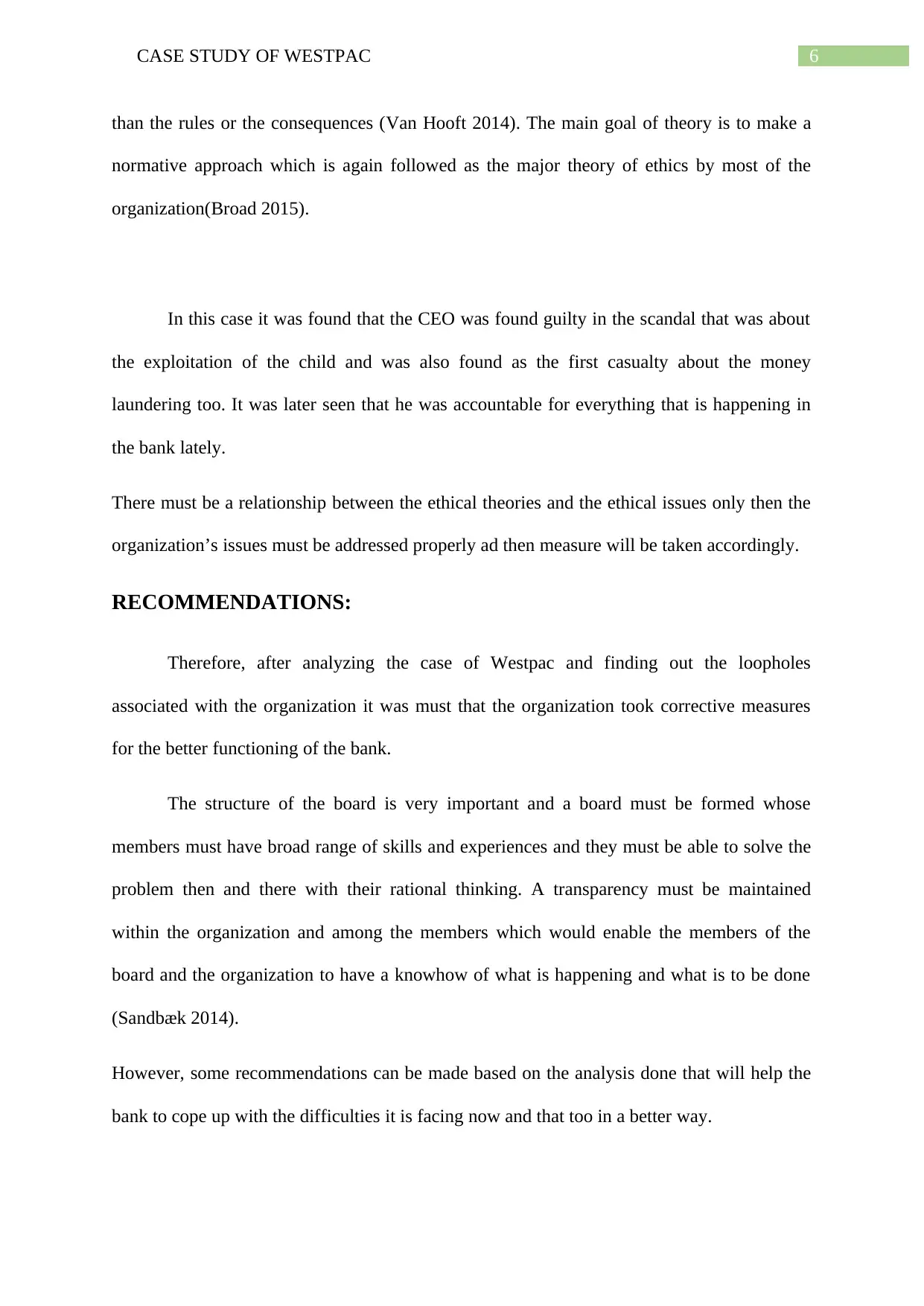
6CASE STUDY OF WESTPAC
than the rules or the consequences (Van Hooft 2014). The main goal of theory is to make a
normative approach which is again followed as the major theory of ethics by most of the
organization(Broad 2015).
In this case it was found that the CEO was found guilty in the scandal that was about
the exploitation of the child and was also found as the first casualty about the money
laundering too. It was later seen that he was accountable for everything that is happening in
the bank lately.
There must be a relationship between the ethical theories and the ethical issues only then the
organization’s issues must be addressed properly ad then measure will be taken accordingly.
RECOMMENDATIONS:
Therefore, after analyzing the case of Westpac and finding out the loopholes
associated with the organization it was must that the organization took corrective measures
for the better functioning of the bank.
The structure of the board is very important and a board must be formed whose
members must have broad range of skills and experiences and they must be able to solve the
problem then and there with their rational thinking. A transparency must be maintained
within the organization and among the members which would enable the members of the
board and the organization to have a knowhow of what is happening and what is to be done
(Sandbæk 2014).
However, some recommendations can be made based on the analysis done that will help the
bank to cope up with the difficulties it is facing now and that too in a better way.
than the rules or the consequences (Van Hooft 2014). The main goal of theory is to make a
normative approach which is again followed as the major theory of ethics by most of the
organization(Broad 2015).
In this case it was found that the CEO was found guilty in the scandal that was about
the exploitation of the child and was also found as the first casualty about the money
laundering too. It was later seen that he was accountable for everything that is happening in
the bank lately.
There must be a relationship between the ethical theories and the ethical issues only then the
organization’s issues must be addressed properly ad then measure will be taken accordingly.
RECOMMENDATIONS:
Therefore, after analyzing the case of Westpac and finding out the loopholes
associated with the organization it was must that the organization took corrective measures
for the better functioning of the bank.
The structure of the board is very important and a board must be formed whose
members must have broad range of skills and experiences and they must be able to solve the
problem then and there with their rational thinking. A transparency must be maintained
within the organization and among the members which would enable the members of the
board and the organization to have a knowhow of what is happening and what is to be done
(Sandbæk 2014).
However, some recommendations can be made based on the analysis done that will help the
bank to cope up with the difficulties it is facing now and that too in a better way.
Paraphrase This Document
Need a fresh take? Get an instant paraphrase of this document with our AI Paraphraser
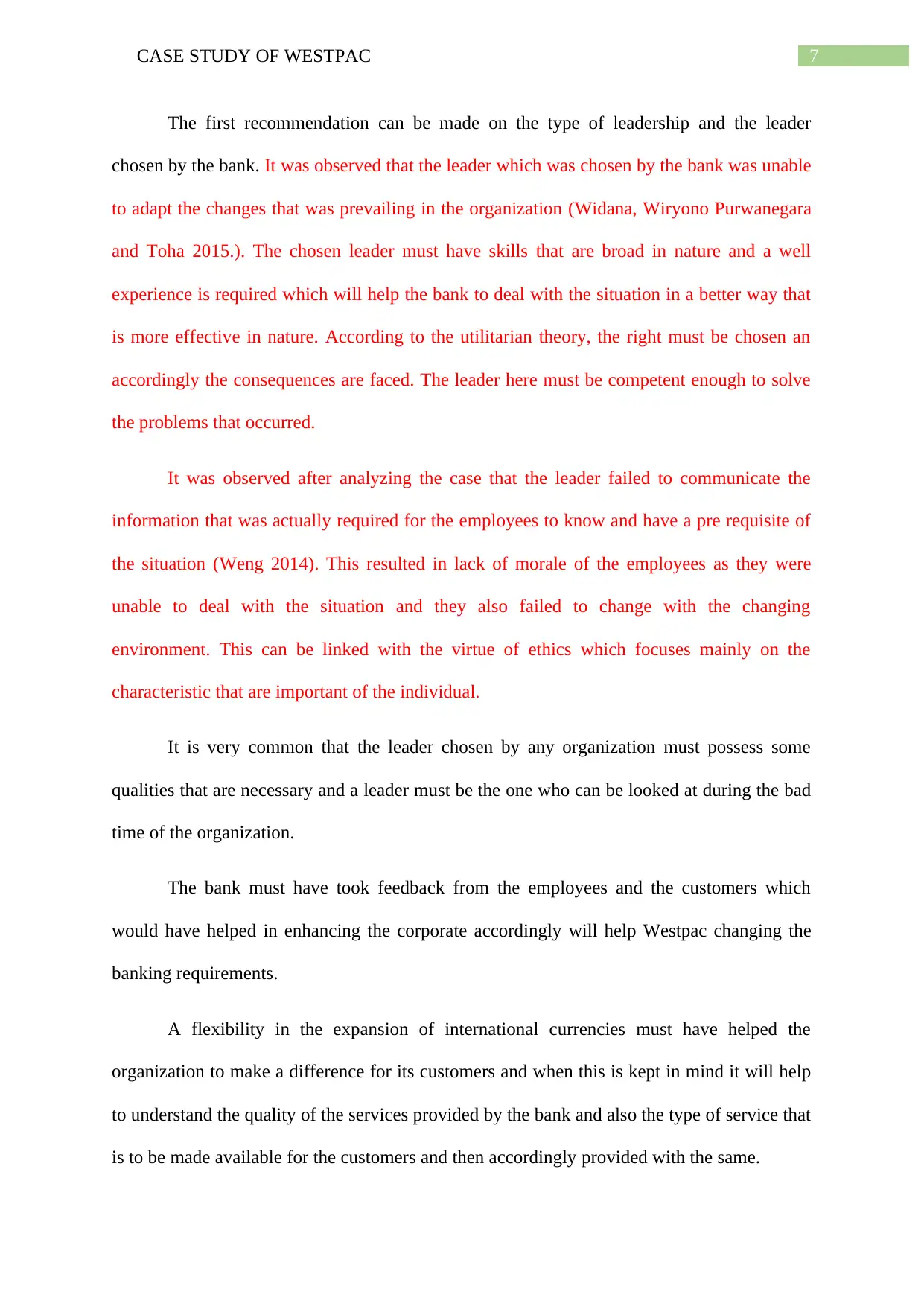
7CASE STUDY OF WESTPAC
The first recommendation can be made on the type of leadership and the leader
chosen by the bank. It was observed that the leader which was chosen by the bank was unable
to adapt the changes that was prevailing in the organization (Widana, Wiryono Purwanegara
and Toha 2015.). The chosen leader must have skills that are broad in nature and a well
experience is required which will help the bank to deal with the situation in a better way that
is more effective in nature. According to the utilitarian theory, the right must be chosen an
accordingly the consequences are faced. The leader here must be competent enough to solve
the problems that occurred.
It was observed after analyzing the case that the leader failed to communicate the
information that was actually required for the employees to know and have a pre requisite of
the situation (Weng 2014). This resulted in lack of morale of the employees as they were
unable to deal with the situation and they also failed to change with the changing
environment. This can be linked with the virtue of ethics which focuses mainly on the
characteristic that are important of the individual.
It is very common that the leader chosen by any organization must possess some
qualities that are necessary and a leader must be the one who can be looked at during the bad
time of the organization.
The bank must have took feedback from the employees and the customers which
would have helped in enhancing the corporate accordingly will help Westpac changing the
banking requirements.
A flexibility in the expansion of international currencies must have helped the
organization to make a difference for its customers and when this is kept in mind it will help
to understand the quality of the services provided by the bank and also the type of service that
is to be made available for the customers and then accordingly provided with the same.
The first recommendation can be made on the type of leadership and the leader
chosen by the bank. It was observed that the leader which was chosen by the bank was unable
to adapt the changes that was prevailing in the organization (Widana, Wiryono Purwanegara
and Toha 2015.). The chosen leader must have skills that are broad in nature and a well
experience is required which will help the bank to deal with the situation in a better way that
is more effective in nature. According to the utilitarian theory, the right must be chosen an
accordingly the consequences are faced. The leader here must be competent enough to solve
the problems that occurred.
It was observed after analyzing the case that the leader failed to communicate the
information that was actually required for the employees to know and have a pre requisite of
the situation (Weng 2014). This resulted in lack of morale of the employees as they were
unable to deal with the situation and they also failed to change with the changing
environment. This can be linked with the virtue of ethics which focuses mainly on the
characteristic that are important of the individual.
It is very common that the leader chosen by any organization must possess some
qualities that are necessary and a leader must be the one who can be looked at during the bad
time of the organization.
The bank must have took feedback from the employees and the customers which
would have helped in enhancing the corporate accordingly will help Westpac changing the
banking requirements.
A flexibility in the expansion of international currencies must have helped the
organization to make a difference for its customers and when this is kept in mind it will help
to understand the quality of the services provided by the bank and also the type of service that
is to be made available for the customers and then accordingly provided with the same.
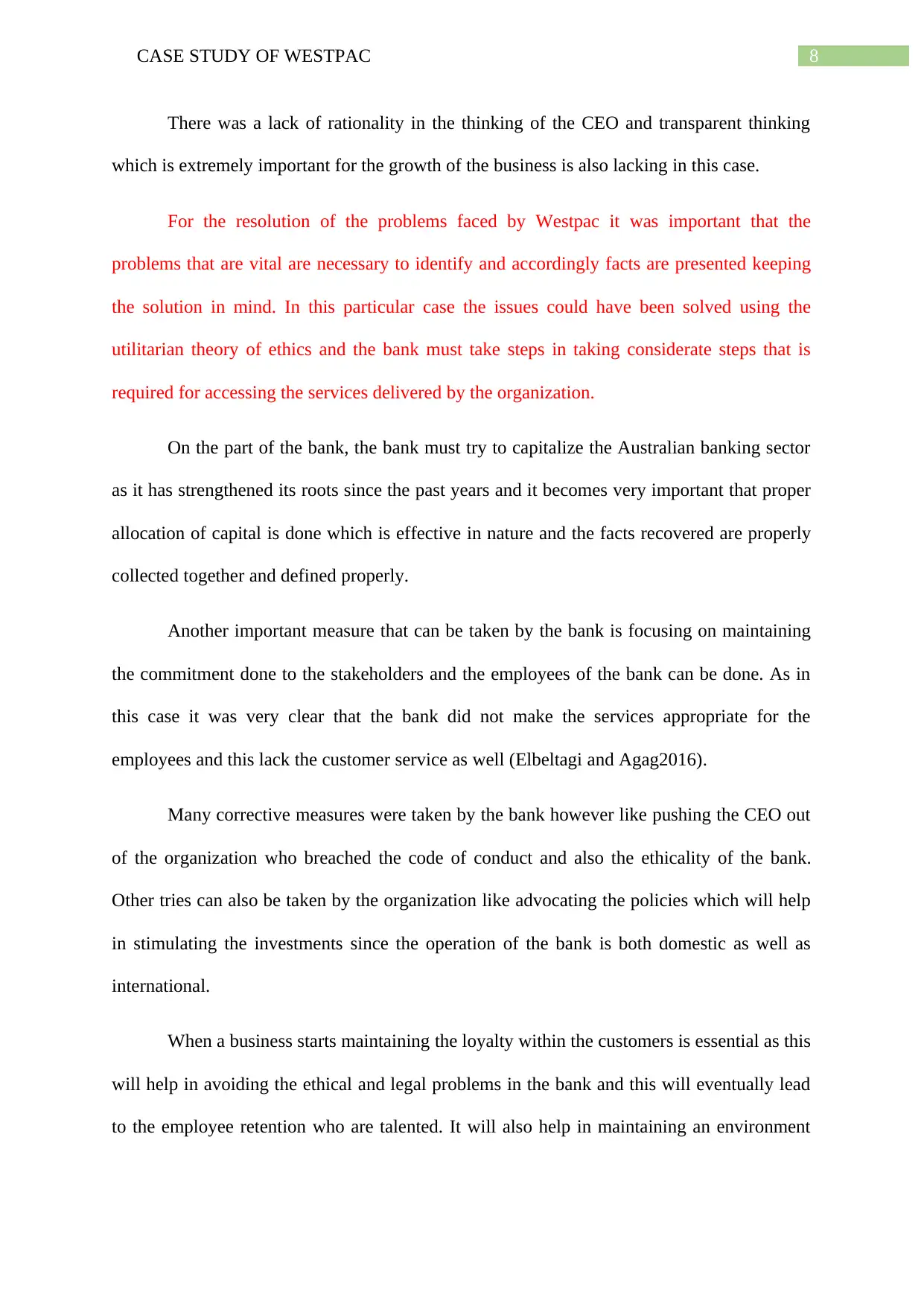
8CASE STUDY OF WESTPAC
There was a lack of rationality in the thinking of the CEO and transparent thinking
which is extremely important for the growth of the business is also lacking in this case.
For the resolution of the problems faced by Westpac it was important that the
problems that are vital are necessary to identify and accordingly facts are presented keeping
the solution in mind. In this particular case the issues could have been solved using the
utilitarian theory of ethics and the bank must take steps in taking considerate steps that is
required for accessing the services delivered by the organization.
On the part of the bank, the bank must try to capitalize the Australian banking sector
as it has strengthened its roots since the past years and it becomes very important that proper
allocation of capital is done which is effective in nature and the facts recovered are properly
collected together and defined properly.
Another important measure that can be taken by the bank is focusing on maintaining
the commitment done to the stakeholders and the employees of the bank can be done. As in
this case it was very clear that the bank did not make the services appropriate for the
employees and this lack the customer service as well (Elbeltagi and Agag2016).
Many corrective measures were taken by the bank however like pushing the CEO out
of the organization who breached the code of conduct and also the ethicality of the bank.
Other tries can also be taken by the organization like advocating the policies which will help
in stimulating the investments since the operation of the bank is both domestic as well as
international.
When a business starts maintaining the loyalty within the customers is essential as this
will help in avoiding the ethical and legal problems in the bank and this will eventually lead
to the employee retention who are talented. It will also help in maintaining an environment
There was a lack of rationality in the thinking of the CEO and transparent thinking
which is extremely important for the growth of the business is also lacking in this case.
For the resolution of the problems faced by Westpac it was important that the
problems that are vital are necessary to identify and accordingly facts are presented keeping
the solution in mind. In this particular case the issues could have been solved using the
utilitarian theory of ethics and the bank must take steps in taking considerate steps that is
required for accessing the services delivered by the organization.
On the part of the bank, the bank must try to capitalize the Australian banking sector
as it has strengthened its roots since the past years and it becomes very important that proper
allocation of capital is done which is effective in nature and the facts recovered are properly
collected together and defined properly.
Another important measure that can be taken by the bank is focusing on maintaining
the commitment done to the stakeholders and the employees of the bank can be done. As in
this case it was very clear that the bank did not make the services appropriate for the
employees and this lack the customer service as well (Elbeltagi and Agag2016).
Many corrective measures were taken by the bank however like pushing the CEO out
of the organization who breached the code of conduct and also the ethicality of the bank.
Other tries can also be taken by the organization like advocating the policies which will help
in stimulating the investments since the operation of the bank is both domestic as well as
international.
When a business starts maintaining the loyalty within the customers is essential as this
will help in avoiding the ethical and legal problems in the bank and this will eventually lead
to the employee retention who are talented. It will also help in maintaining an environment
⊘ This is a preview!⊘
Do you want full access?
Subscribe today to unlock all pages.

Trusted by 1+ million students worldwide
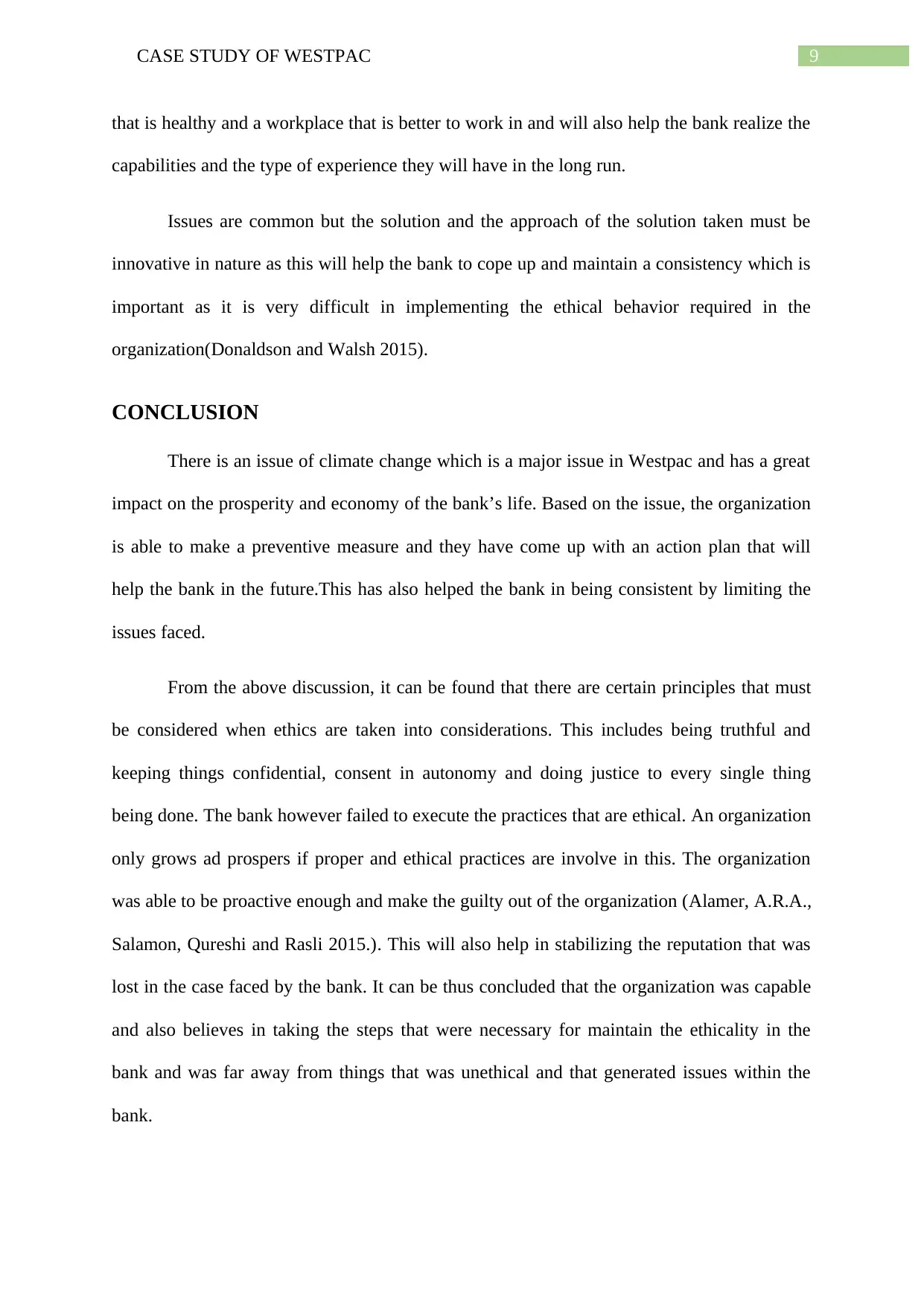
9CASE STUDY OF WESTPAC
that is healthy and a workplace that is better to work in and will also help the bank realize the
capabilities and the type of experience they will have in the long run.
Issues are common but the solution and the approach of the solution taken must be
innovative in nature as this will help the bank to cope up and maintain a consistency which is
important as it is very difficult in implementing the ethical behavior required in the
organization(Donaldson and Walsh 2015).
CONCLUSION
There is an issue of climate change which is a major issue in Westpac and has a great
impact on the prosperity and economy of the bank’s life. Based on the issue, the organization
is able to make a preventive measure and they have come up with an action plan that will
help the bank in the future.This has also helped the bank in being consistent by limiting the
issues faced.
From the above discussion, it can be found that there are certain principles that must
be considered when ethics are taken into considerations. This includes being truthful and
keeping things confidential, consent in autonomy and doing justice to every single thing
being done. The bank however failed to execute the practices that are ethical. An organization
only grows ad prospers if proper and ethical practices are involve in this. The organization
was able to be proactive enough and make the guilty out of the organization (Alamer, A.R.A.,
Salamon, Qureshi and Rasli 2015.). This will also help in stabilizing the reputation that was
lost in the case faced by the bank. It can be thus concluded that the organization was capable
and also believes in taking the steps that were necessary for maintain the ethicality in the
bank and was far away from things that was unethical and that generated issues within the
bank.
that is healthy and a workplace that is better to work in and will also help the bank realize the
capabilities and the type of experience they will have in the long run.
Issues are common but the solution and the approach of the solution taken must be
innovative in nature as this will help the bank to cope up and maintain a consistency which is
important as it is very difficult in implementing the ethical behavior required in the
organization(Donaldson and Walsh 2015).
CONCLUSION
There is an issue of climate change which is a major issue in Westpac and has a great
impact on the prosperity and economy of the bank’s life. Based on the issue, the organization
is able to make a preventive measure and they have come up with an action plan that will
help the bank in the future.This has also helped the bank in being consistent by limiting the
issues faced.
From the above discussion, it can be found that there are certain principles that must
be considered when ethics are taken into considerations. This includes being truthful and
keeping things confidential, consent in autonomy and doing justice to every single thing
being done. The bank however failed to execute the practices that are ethical. An organization
only grows ad prospers if proper and ethical practices are involve in this. The organization
was able to be proactive enough and make the guilty out of the organization (Alamer, A.R.A.,
Salamon, Qureshi and Rasli 2015.). This will also help in stabilizing the reputation that was
lost in the case faced by the bank. It can be thus concluded that the organization was capable
and also believes in taking the steps that were necessary for maintain the ethicality in the
bank and was far away from things that was unethical and that generated issues within the
bank.
Paraphrase This Document
Need a fresh take? Get an instant paraphrase of this document with our AI Paraphraser
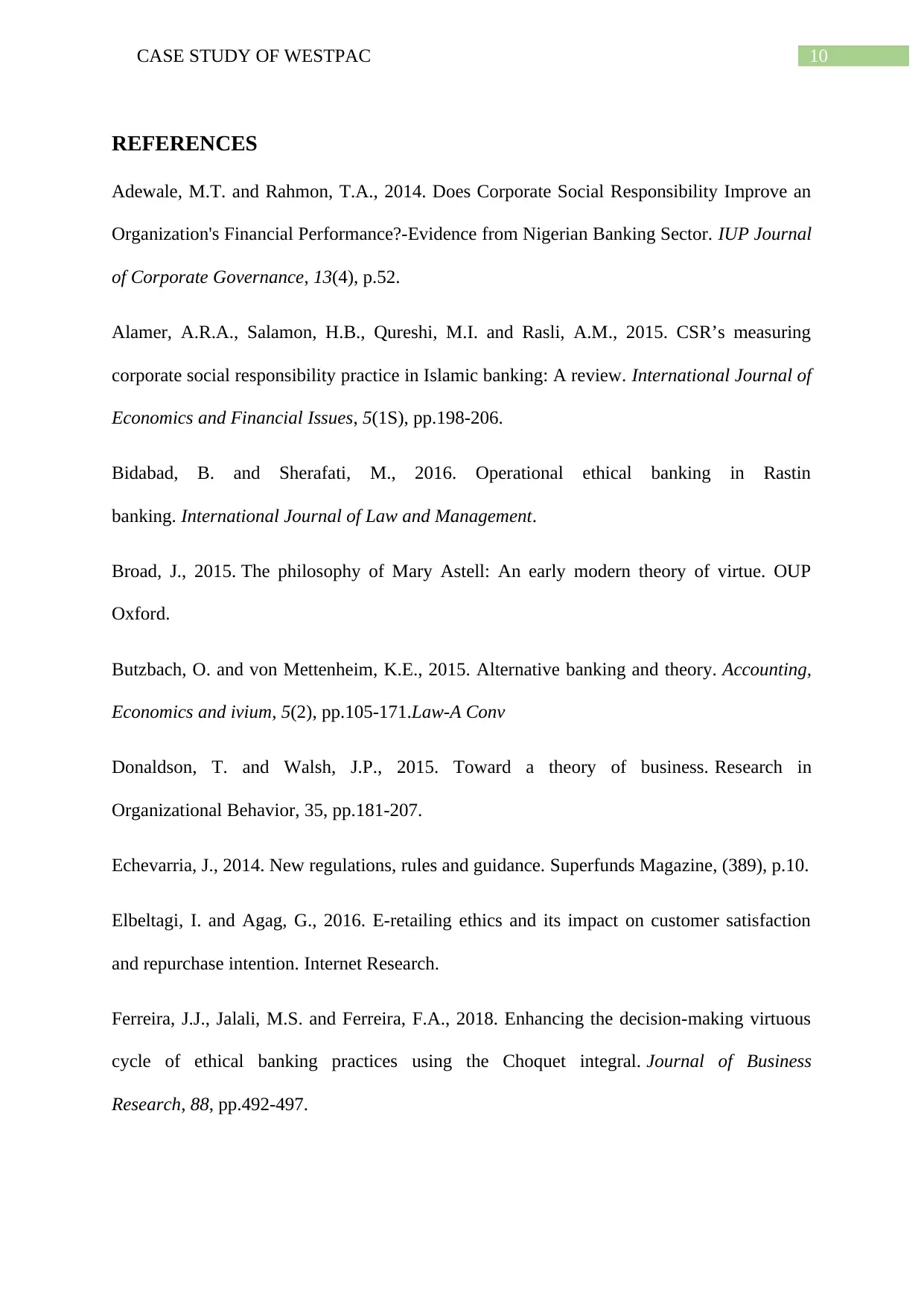
10CASE STUDY OF WESTPAC
REFERENCES
Adewale, M.T. and Rahmon, T.A., 2014. Does Corporate Social Responsibility Improve an
Organization's Financial Performance?-Evidence from Nigerian Banking Sector. IUP Journal
of Corporate Governance, 13(4), p.52.
Alamer, A.R.A., Salamon, H.B., Qureshi, M.I. and Rasli, A.M., 2015. CSR’s measuring
corporate social responsibility practice in Islamic banking: A review. International Journal of
Economics and Financial Issues, 5(1S), pp.198-206.
Bidabad, B. and Sherafati, M., 2016. Operational ethical banking in Rastin
banking. International Journal of Law and Management.
Broad, J., 2015. The philosophy of Mary Astell: An early modern theory of virtue. OUP
Oxford.
Butzbach, O. and von Mettenheim, K.E., 2015. Alternative banking and theory. Accounting,
Economics and ivium, 5(2), pp.105-171.Law-A Conv
Donaldson, T. and Walsh, J.P., 2015. Toward a theory of business. Research in
Organizational Behavior, 35, pp.181-207.
Echevarria, J., 2014. New regulations, rules and guidance. Superfunds Magazine, (389), p.10.
Elbeltagi, I. and Agag, G., 2016. E-retailing ethics and its impact on customer satisfaction
and repurchase intention. Internet Research.
Ferreira, J.J., Jalali, M.S. and Ferreira, F.A., 2018. Enhancing the decision-making virtuous
cycle of ethical banking practices using the Choquet integral. Journal of Business
Research, 88, pp.492-497.
REFERENCES
Adewale, M.T. and Rahmon, T.A., 2014. Does Corporate Social Responsibility Improve an
Organization's Financial Performance?-Evidence from Nigerian Banking Sector. IUP Journal
of Corporate Governance, 13(4), p.52.
Alamer, A.R.A., Salamon, H.B., Qureshi, M.I. and Rasli, A.M., 2015. CSR’s measuring
corporate social responsibility practice in Islamic banking: A review. International Journal of
Economics and Financial Issues, 5(1S), pp.198-206.
Bidabad, B. and Sherafati, M., 2016. Operational ethical banking in Rastin
banking. International Journal of Law and Management.
Broad, J., 2015. The philosophy of Mary Astell: An early modern theory of virtue. OUP
Oxford.
Butzbach, O. and von Mettenheim, K.E., 2015. Alternative banking and theory. Accounting,
Economics and ivium, 5(2), pp.105-171.Law-A Conv
Donaldson, T. and Walsh, J.P., 2015. Toward a theory of business. Research in
Organizational Behavior, 35, pp.181-207.
Echevarria, J., 2014. New regulations, rules and guidance. Superfunds Magazine, (389), p.10.
Elbeltagi, I. and Agag, G., 2016. E-retailing ethics and its impact on customer satisfaction
and repurchase intention. Internet Research.
Ferreira, J.J., Jalali, M.S. and Ferreira, F.A., 2018. Enhancing the decision-making virtuous
cycle of ethical banking practices using the Choquet integral. Journal of Business
Research, 88, pp.492-497.
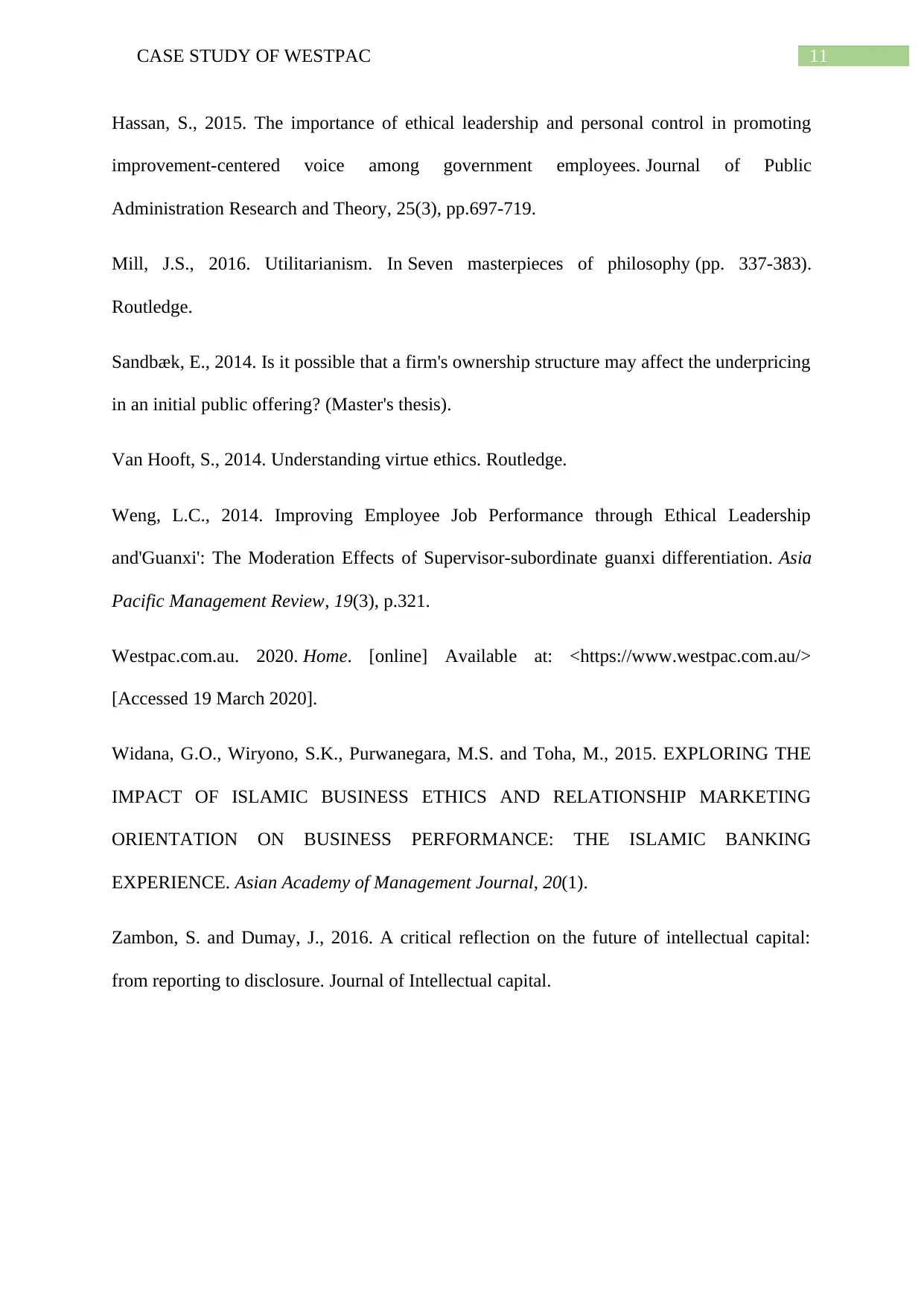
11CASE STUDY OF WESTPAC
Hassan, S., 2015. The importance of ethical leadership and personal control in promoting
improvement-centered voice among government employees. Journal of Public
Administration Research and Theory, 25(3), pp.697-719.
Mill, J.S., 2016. Utilitarianism. In Seven masterpieces of philosophy (pp. 337-383).
Routledge.
Sandbæk, E., 2014. Is it possible that a firm's ownership structure may affect the underpricing
in an initial public offering? (Master's thesis).
Van Hooft, S., 2014. Understanding virtue ethics. Routledge.
Weng, L.C., 2014. Improving Employee Job Performance through Ethical Leadership
and'Guanxi': The Moderation Effects of Supervisor-subordinate guanxi differentiation. Asia
Pacific Management Review, 19(3), p.321.
Westpac.com.au. 2020. Home. [online] Available at: <https://www.westpac.com.au/>
[Accessed 19 March 2020].
Widana, G.O., Wiryono, S.K., Purwanegara, M.S. and Toha, M., 2015. EXPLORING THE
IMPACT OF ISLAMIC BUSINESS ETHICS AND RELATIONSHIP MARKETING
ORIENTATION ON BUSINESS PERFORMANCE: THE ISLAMIC BANKING
EXPERIENCE. Asian Academy of Management Journal, 20(1).
Zambon, S. and Dumay, J., 2016. A critical reflection on the future of intellectual capital:
from reporting to disclosure. Journal of Intellectual capital.
Hassan, S., 2015. The importance of ethical leadership and personal control in promoting
improvement-centered voice among government employees. Journal of Public
Administration Research and Theory, 25(3), pp.697-719.
Mill, J.S., 2016. Utilitarianism. In Seven masterpieces of philosophy (pp. 337-383).
Routledge.
Sandbæk, E., 2014. Is it possible that a firm's ownership structure may affect the underpricing
in an initial public offering? (Master's thesis).
Van Hooft, S., 2014. Understanding virtue ethics. Routledge.
Weng, L.C., 2014. Improving Employee Job Performance through Ethical Leadership
and'Guanxi': The Moderation Effects of Supervisor-subordinate guanxi differentiation. Asia
Pacific Management Review, 19(3), p.321.
Westpac.com.au. 2020. Home. [online] Available at: <https://www.westpac.com.au/>
[Accessed 19 March 2020].
Widana, G.O., Wiryono, S.K., Purwanegara, M.S. and Toha, M., 2015. EXPLORING THE
IMPACT OF ISLAMIC BUSINESS ETHICS AND RELATIONSHIP MARKETING
ORIENTATION ON BUSINESS PERFORMANCE: THE ISLAMIC BANKING
EXPERIENCE. Asian Academy of Management Journal, 20(1).
Zambon, S. and Dumay, J., 2016. A critical reflection on the future of intellectual capital:
from reporting to disclosure. Journal of Intellectual capital.
⊘ This is a preview!⊘
Do you want full access?
Subscribe today to unlock all pages.

Trusted by 1+ million students worldwide
1 out of 13
Related Documents
Your All-in-One AI-Powered Toolkit for Academic Success.
+13062052269
info@desklib.com
Available 24*7 on WhatsApp / Email
![[object Object]](/_next/static/media/star-bottom.7253800d.svg)
Unlock your academic potential
Copyright © 2020–2026 A2Z Services. All Rights Reserved. Developed and managed by ZUCOL.





